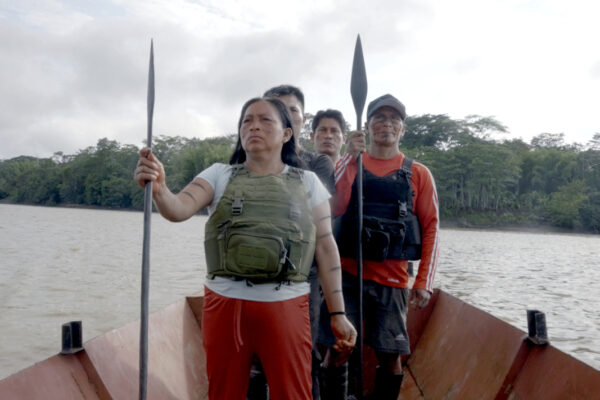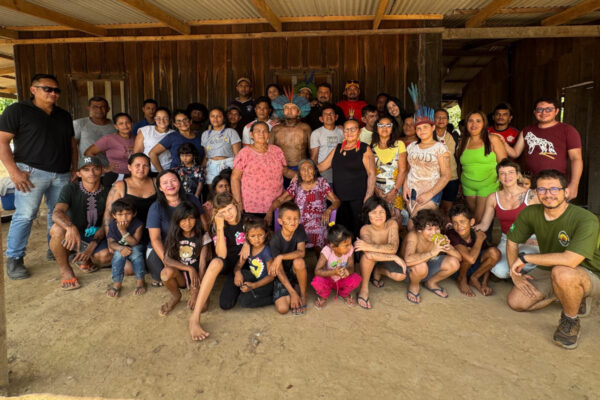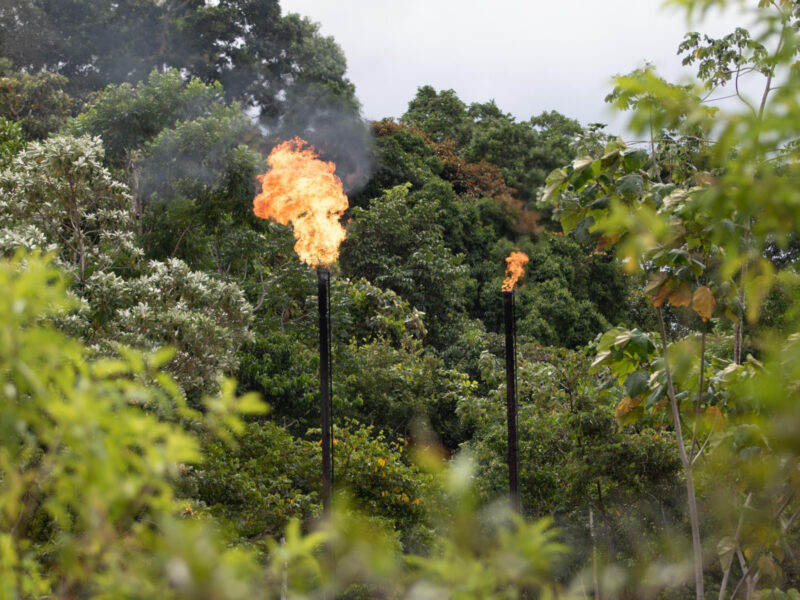Peruvian oil company Petroperú sent us a new letter dated April 5, 2023 to reiterate that its presence in Block 64 is fully compliant with legal standards and that it has social legitimacy to operate. The letter repeats arguments the company has stated previously through different communication channels (including a previous letter to Amazon Watch sent on September 16, 2022. We reiterate that this statement is incorrect, as we will explain below.
Amazon Watch is supporting the Achuar and Wampis Indigenous peoples so that they can alert the public and financial institutions in particular that the oil Block 64, which is not yet in operation, has been granted against the will of the representative organizations of the Achuar (Federation of the Achuar Nationality of Peru – FENAP) and Wampis (Autonomous Territorial Government of the Wampis Nation – GTANW) peoples. This happened without complying with the normative and ethical requirement of carrying out prior consultation, as is obligatory according to international law and Peruvian policy.
In its April 5th letter , Petroperú acknowledges that both organizations (FENAP and GTANW), legitimate representatives of their peoples, do not want oil activity, but to justify its actions it argues that “some communities, those within the [oil block]” do agree with oil exploitation. However, it confirms that the Peruvian government refuses to carry out a prior consultation, arguing that the Ministry of Energy and Mines has indicated that this formal procedure is not necessary, since the concession was granted in 1996.
On that matter, we refer to the same answer we provided in October 2022, in a public response to Petroperú:
In the letter, Petroperú claims that it sufficiently complied with requirements to carry out free, prior, and informed consultation with impacted Indigenous communities. In making this claim, Petroperú relies on a legal argument from Peru’s Ministry of Energy and Mines (MINEM), despite the fact that this opinion contradicts rulings from Peru’s Constitutional Court and findings from international legal bodies.
MINEM argues that Convention 169 on Indigenous and Tribal Peoples, adopted by the International Labor Organization, allows each country to implement its own criteria to conduct free, prior, and informed consent (FPIC) processes. MINEM also notes that between 1995 (when the ILO Convention entered into force in Peru) and 2011 (date in which Law No 29785 implementing prior consultation was approved in Peru), there was no specific regulation guiding the implementation of ILO Convention 169 criteria in Peru. Therefore, during this time frame, companies conducted “various intercultural dialogue mechanisms,” which, according to the MINEM, complied with the requirements of ILO Convention 169.
However, in 2011 the Peruvian Constitutional Court ruled against this argument. In Judgment N° 00025-2009-PI/TC, the Court found that FPIC under international standards has been required in Peru since February 2, 1995, twelve months after the date Peru ratified Convention 169. In a 2010 ruling, Judgment N° 0022-2009-PI/TC, the Court explained that “[a]lthough Convention 169 has been in force in our country since 1995, the government has not consistently implemented it.”
Similarly, the ILO Committee of Experts on the Application of Conventions and Recommendations found in its 2009 Report that “[t]he Committee notes that […] efforts [of consultation and participation] appear to be isolated and sporadic and at times not in line with the Convention (for example, information meetings being held rather than consultations).” Furthermore, in its 2010 report, the ILO Committee of Experts notes that “the Peruvian government construes consultation as ‘processes whereby points of view are exchanged’ and has held a series of socialization workshops. It also notes that the government refers to Decree No 012-2008-MEM (regulations on citizens’ participation in hydrocarbon activities), according to which the purpose of consultation is ‘to reach a better understanding of the scope of the project and its benefits,’ which is much narrower than what the Convention provides.”
Additionally, Petroperú’s letter claims that Perupetro (the Peruvian licensing agency), allegedly complies with the international standards for FPIC by introducing Petroperú as the new operator of Block 64, arguing that it follows the procedures of citizen participation in oil activities outlined in Decree No 002-2019-EM. However, what constituted this “introduction” was an attempt by Perupetro to hold a face-to-face meeting in February 2022 in the city of San Lorenzo, Loreto, with Achuar communities in order to introduce Petroperú as the new operator. However, the Achuar People from the Pastaza River opposed having this face-to-face meeting due to potential COVID-19 exposure amidst rising COVID infections in the region at the time. Perupetro insisted on having this in-person meeting, so, in response, the Achuar people filed a criminal lawsuit against Perupetro. As a consequence of the lawsuit, Perupetro desisted from having the face-to-face gathering, replacing it with mail correspondence facilitated by the installation of physical mailboxes in the municipalities, as well as emails.
Furthermore, “citizen participation” mechanisms are not equivalent to compliance with FPIC under international standards. The Inter-American Commission has indicated in its report, Rights of Indigenous and Tribal Peoples regarding its ancestral lands and natural resources, that the process of FPIC “is not a singular act, but a process of dialogue and negotiation that implies good faith.” Therefore, Petroperú can not accurately claim that a single meeting to introduce the new operator to some communities would comply with the international standards of FPIC, even if it had actually taken place. Adequate FPIC implementation requires a comprehensive plan, covering everything from the design to the implementation of the project, and fully consulting with the array of impacted communities. As such, an adequate FPIC process cannot be completed in just one brief gathering.
In conclusion, the obligation to comply with the international standards of FPIC was mandatory for Peru from February 1995. Block 64 was created in 1995 and the first operating lease was auctioned in December of that year. Therefore, under international standards, the impacted communities should have been consulted for the creation of Block 64 as well as all related leasing contracts, which did not happen. As such, the “intercultural dialogue mechanisms”, mentioned by the MINEM cannot be considered as complying with the international standards of FPIC.












